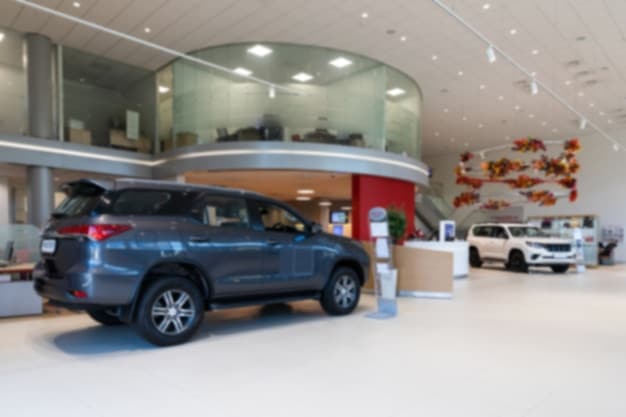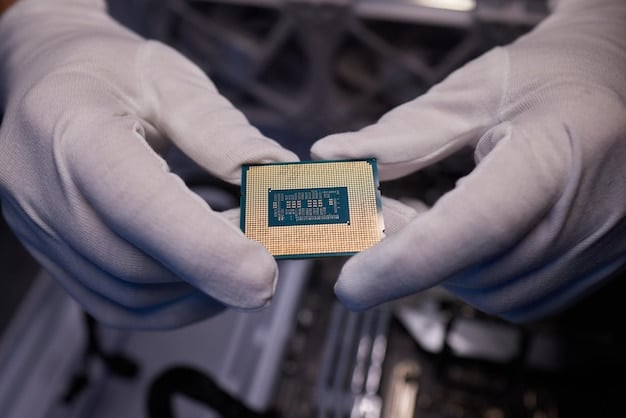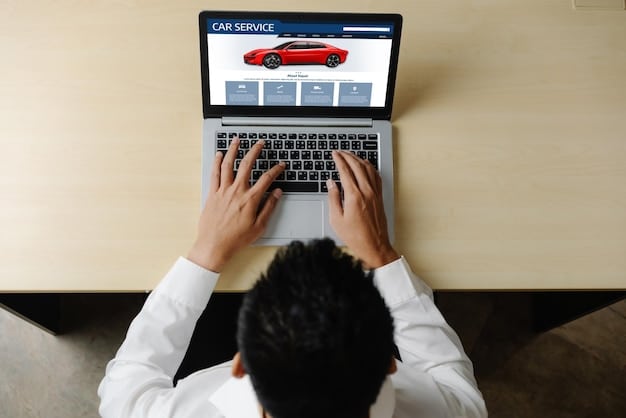Car Buying in 2025: Expert Negotiation Tips for a Seller’s Market

Navigating the car market in 2025, especially in a seller’s market, requires savvy negotiation skills; understanding market trends, leveraging online resources, and preparing a solid financial strategy are crucial for securing the best possible price.
Planning to buy a car in 2025? The landscape has shifted, and mastering the art of negotiation is key, especially in what’s projected to be a continuing seller’s market. This guide provides you with the strategies to successfully navigate **car buying in 2025: how to negotiate the best price in a seller’s market**.
Understanding the 2025 Car Market Dynamics
The future of car buying is evolving rapidly. To get the best deal in 2025, understanding the dynamics of a seller’s market is essential.
Factors Influencing Car Prices in 2025
Several factors contribute to the pricing of vehicles. These include supply chain issues, technological advancements, and consumer demand.
The Impact of Chip Shortages and Supply Chain Disruptions
Ongoing global events can significantly impact car availability and prices. Understanding these impacts is crucial before negotiating.

Key considerations for understanding the market:
- Analyze current market reports to understand the demand and supply balance.
- Factor in the potential continuation of chip shortages impacting production.
- Look for government policies or incentives that may influence car prices.
Remaining informed about these overarching market forces is a major asset for any savvy car buyer.
Preparing a Solid Financial Strategy
Before setting foot in a dealership, a solid financial strategy is critical. This not only sets a budget but also prepares you for negotiations.
Assessing Your Current Financial Situation
Start by evaluating your income, expenses, and credit score. This will give you a clear picture of what you can afford.
Budgeting for a Car Purchase
Allocate a realistic budget for both the purchase price and ongoing expenses such as insurance, maintenance, and fuel.
Steps to create a financial strategy:
- Check your credit score and address any issues beforehand.
- Determine how much you can realistically afford monthly.
- Consider pre-approval for a car loan to understand interest rates.
Having a clear budget demonstrates to dealers that you are a serious and prepared buyer.
Leveraging Online Resources for Research and Negotiation
Online tools can empower you with the necessary information to negotiate effectively and secure a better deal.
Using Online Car Valuation Tools
These tools provide an estimated market value for new and used cars, aiding in pricing discussions.
Comparing Prices Across Different Dealerships
Websites and apps allow you to compare prices from various dealerships, potentially finding deals they are afraid to lose.

With online resources, you can compare prices and find more competitive deals. The goal should be to arm yourself with as much information as possible before starting negotiations.
Effective Negotiation Techniques for a Seller’s Market
In a seller’s market, traditional negotiation tactics may not be enough. Adapt these strategic approaches to navigate negotiations successfully.
The Art of Timing: When to Buy
Buying at the end of the month or quarter may offer leverage as dealers aim to meet quotas.
Focusing on the Out-the-Door Price
Concentrate on the total price, including all fees and taxes, to avoid hidden costs.
Strategies for effective negotiation:
- Be prepared to walk away if the deal doesn’t meet your terms.
- Negotiate the out-the-door price rather than just the monthly payment.
- Use competitive offers from other dealerships as leverage.
Effective negotiation is about patience, preparation, and a willingness to explore alternatives.
Evaluating Trade-In Options Wisely
If you’re trading in a vehicle, maximizing its value can significantly impact your overall deal.
Getting Your Car Appraised Independently
Obtain appraisals from multiple sources to understand your car’s market value before visiting the dealership.
Negotiating Trade-In and New Car Prices Separately
Keep these conversations distinct to prevent them from influencing each other detrimentally.
To optimize your trade-in value, consider these steps:
- Get an independent appraisal to know your car’s actual worth.
- Negotiate the trade-in price apart from the new car’s price.
- Be prepared to sell your car privately if the trade-in value is too low.
By treating your trade-in as a separate transaction, you ensure a better chance of securing the best possible value.
Exploring Alternatives to New Car Purchases
In a tough seller’s market, considering alternatives to buying new can be a strategic move. Weigh the pros and cons of each option.
Considering Certified Pre-Owned Vehicles
These cars offer the reliability of a newer vehicle at a lower price point, with warranties.
Leasing as a Short-Term Option
Leasing can provide access to a new car without the long-term commitment of ownership, offering flexibility.
Assess whether new car ownership is essential or if there are viable alternatives that suit your needs.
Here are some alternative options to consider:
- Explore certified pre-owned vehicles for reliability and value.
- Consider leasing a car if you prefer to upgrade frequently.
- Look into car subscription services for flexible, all-inclusive options.
Exploring these alternatives can provide more control over your budget and purchasing options.
| Key Point | Brief Description |
|---|---|
| 💰 Budgeting | Know your financial limits before negotiating. |
| 💻 Online Research | Leverage online tools for price comparisons. |
| ⏱️ Timing | Shop at month-end or quarter-end for better deals. |
| 🔄 Trade-In | Get independent appraisal for your trade-in. |
Frequently Asked Questions
▼
A seller’s market occurs when demand exceeds supply, leading to higher prices and less negotiation room. Knowing this helps prepare for potentially higher car prices.
▼
Start by checking your credit score, setting a realistic budget, and getting pre-approved for a loan. This makes negotiation smoother and more effective.
▼
Yes, buying towards the end of the month or quarter can offer advantages as dealers strive to meet sales quotas, potentially lowering prices.
▼
Consider certified pre-owned vehicles for reliability at a lower cost, or explore leasing for short-term use without ownership commitments and responsibilities.
▼
It is crucial. Knowing your car’s market value before negotiating helps ensure you receive a fair trade-in offer, preventing undervaluation by the dealer.
Conclusion
Successfully navigating car buying in 2025, especially in a seller’s market, requires a mix of strategic planning, financial preparation, and savvy negotiation. By understanding market dynamics, leveraging online resources, and remaining flexible with your options, you can increase your chances of securing the best possible deal, even when the odds seem stacked against you.





